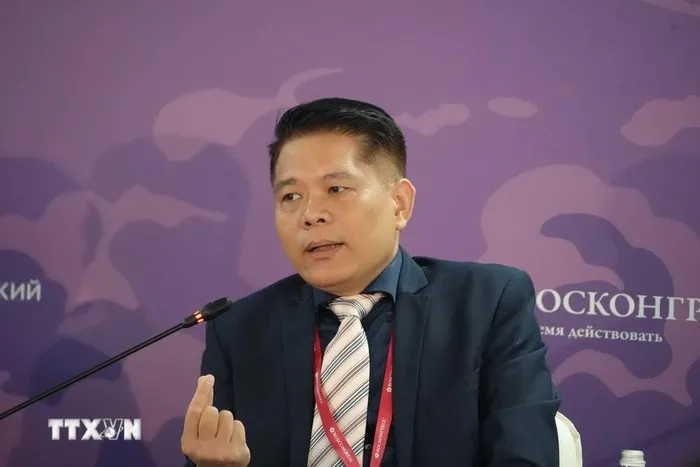On September 4th, within the framework of the Eastern Economic Forum, a thematic discussion session was held on "The Challenges of the 21st Century for Traditional Education Systems in the Asia-Pacific Economic Cooperation (APEC) Economies."
The discussion aimed to connect collaborative efforts, thereby shaping more responsive, inclusive, and forward-looking education policies for the 21st century.
The event was attended by representatives from leading universities in the region, including Russia, China, Vietnam, and Japan.
Associate Professor Bui Thanh Nam - Vice Chairman of the University Council of the University of Social Sciences and Humanities, Vietnam National University, Hanoi, presents his paper. (Photo: Quang Vinh/VNA)
Assoc. Prof. Dr.
Bui Thanh Nam, Vice Chairman of the University Council of the Faculty of Social Sciences and Humanities, Vietnam National University, Hanoi, gave a speech at the discussion session.
The world has undergone significant changes in recent years, including the COVID-19 pandemic and the rapid development of information technology, which have altered learning and training habits. The economic impacts of this global situation have also significantly altered labor market demands, forcing the education sector to quickly adapt to equip students with the knowledge and skills necessary for real-world needs.
At the event, participating delegates affirmed that the discussion session "Challenges of the 21st Century for Traditional Education Systems in APEC Economies" was truly necessary in the current situation, offering an opportunity to explore prospects for education policies in APEC economies, thereby directly contributing to the development of the region's economy in the future.
The delegates also emphasized the need for enhanced international cooperation in education in a rapid and flexible manner to address current challenges.
In his presentation at the discussion session, Associate Professor Dr. Bui Thanh Nam shared the experiences of reforming educational methods at the University of Social Sciences and Humanities, which were highly appreciated by the delegates. According to Dr. Nam, in the context of implementing the open-door strategy in the field of education, Vietnam is expanding various forms of international cooperation, no longer limited to the exchange of lecturers and students as before.
For its part, the University of Social Sciences and Humanities is currently seeking new avenues of cooperation, such as mutual credit recognition, enabling students to participate in advanced training environments abroad while ensuring they complete their training programs domestically, without incurring excessive financial burdens.
Speaking to a VNA reporter after the discussion session, Evgeniy Vlasov, Vice Rector for International Relations at the Far Eastern Federal University, said that the purpose of this discussion session was to connect with the southern provinces of China, as this region actively participates in APEC economic cooperation.
In this context, enhanced cooperation among universities in the region can support positive economic development and improve the living standards of people living in this area.
The 9th Eastern Economic Forum, themed “Far East 2030: Connecting Strengths to Create New Potential,” took place from September 3-6 in Vladivostok, Russia. This year's forum attracted over 6,000 delegates from 76 countries and territories worldwide.
VietnamPlus:Vietnam expands international cooperation to address new challenges in education.
